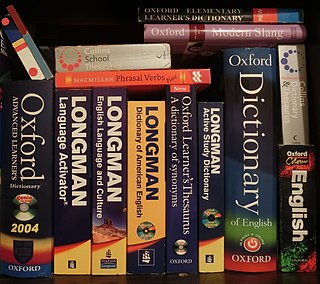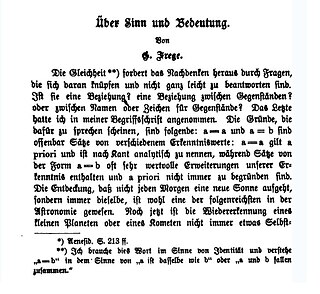 W
WIn analytic philosophy, philosophy of language investigates the nature of language, the relations between language, language users, and the world. Investigations may include inquiry into the nature of meaning, intentionality, reference, the constitution of sentences, concepts, learning, and thought.
 W
W"The Analytical Language of John Wilkins" is a short essay by Argentine writer Jorge Luis Borges originally published in Otras Inquisiciones (1937–1952). It is a critique of the English natural philosopher and writer John Wilkins's proposal for a universal language and of the representational capacity of language generally. In it, Borges imagines a bizarre and whimsical Chinese taxonomy later quoted by Michel Foucault, David Byrne, and others.
 W
WThe Austrian Ludwig Wittgenstein Society was first established in 1974 to promote philosophical conferences, workshops, summer schools, and research that are inspired by the work of Ludwig Wittgenstein and the Vienna Circle. It is an international society, which also has a publication series.
 W
WRudolf Carnap was a German-language philosopher who was active in Europe before 1935 and in the United States thereafter. He was a major member of the Vienna Circle and an advocate of logical positivism. He is considered "one of the giants among twentieth-century philosophers."
 W
WConcepts are defined as abstract ideas or general notions that occur in the mind, in speech, or in thought. They are understood to be the fundamental building blocks of thoughts and beliefs. They play an important role in all aspects of cognition. As such, concepts are studied by several disciplines, such as linguistics, psychology, and philosophy, and these disciplines are interested in the logical and psychological structure of concepts, and how they are put together to form thoughts and sentences. The study of concepts has served as an important flagship of an emerging interdisciplinary approach called cognitive science.
 W
WDeconstruction is an approach to understanding the relationship between text and meaning. It was originated by the philosopher Jacques Derrida (1930–2004), who defined the term variously throughout his career. In its simplest form it can be regarded as a criticism of Platonism and the idea of true forms, or essences, which take precedence over appearances. Deconstruction instead places the emphasis on appearance, or suggests, at least, that essence is to be found in appearance. Derrida would say that the difference is "undecidable", in that it cannot be discerned in everyday experiences.
 W
WA definition is a statement of the meaning of a term. Definitions can be classified into two large categories, intensional definitions and extensional definitions. Another important category of definitions is the class of ostensive definitions, which convey the meaning of a term by pointing out examples. A term may have many different senses and multiple meanings, and thus require multiple definitions.
 W
WPrototypical conditional sentences in English are those of the form "If X, then Y". The clause X is referred to as the antecedent, while the clause Y is called the consequent. A conditional is understood as expressing its consequent under the temporary hypothetical assumption of its antecedent.
 W
WMikhail Naumovich Epstein is a Russian-American literary scholar and essayist who is Samuel Candler Dobbs Professor of Cultural Theory and Russian Literature at Emory University, Atlanta, US. He moved there from Moscow, USSR, in 1990. He has also worked as a Professor of Russian and Cultural Theory at Durham University, UK, from 2012 to 2015, where he was the founder and Director of the Centre for Humanities Innovation at Durham University.
 W
WIn Greek mythology, Hesperus is the Evening Star, the planet Venus in the evening. He is the son of the dawn goddess Eos and is the half-brother of her other son, Phosphorus. Hesperus' Roman equivalent is Vesper. By one account Hesperus' father was Cephalus, a mortal, while Phosphorus' was the star god Astraios. Other sources, however, state that Hesperus was the brother of Atlas, and thus the son of Iapetus.
 W
WThe Khovansky Foundation is a non-profit organization, founded in Voronezh in 1899. It is financed by funds ownership and donations from the citizens and associations.
 W
WA language-game is a philosophical concept developed by Ludwig Wittgenstein, referring to simple examples of language use and the actions into which the language is woven. Wittgenstein argued that a word or even a sentence has meaning only as a result of the "rule" of the "game" being played. Depending on the context, for example, the utterance "Water!" could be an order, the answer to a question, or some other form of communication.
 W
WThe linguistic turn was a major development in Western philosophy during the early 20th century, the most important characteristic of which is the focusing of philosophy and the other humanities primarily on the relations between language, language users, and the world.
 W
WIn philosophy and mathematics, logical form of a syntactic expression is a precisely-specified semantic version of that expression in a formal system. Informally, the logical form attempts to formalize a possibly ambiguous statement into a statement with a precise, unambiguous logical interpretation with respect to a formal system. In an ideal formal language, the meaning of a logical form can be determined unambiguously from syntax alone. Logical forms are semantic, not syntactic constructs; therefore, there may be more than one string that represents the same logical form in a given language.
 W
WThe private language argument argues that a language understandable by only a single individual is incoherent, and was introduced by Ludwig Wittgenstein in his later work, especially in the Philosophical Investigations. The argument was central to philosophical discussion in the second half of the 20th century.
 W
WSelf-reference occurs in natural or formal languages when a sentence, idea or formula refers to itself. The reference may be expressed either directly—through some intermediate sentence or formula—or by means of some encoding. In philosophy, it also refers to the ability of a subject to speak of or refer to itself, that is, to have the kind of thought expressed by the first person nominative singular pronoun "I" in English.
 W
WIn the philosophy of language, the distinction between sense and reference was an innovation of the German philosopher and mathematician Gottlob Frege in 1892, reflecting the two ways he believed a singular term may have meaning.
 W
WThe triangle of reference is a model of how linguistic symbols are related to the objects they represent. The triangle was published in The Meaning of Meaning (1923) by Charles Kay Ogden and I. A. Richards. While often referred to as the "Ogden/Richards triangle", the idea was also expressed in 1810, by Bernard Bolzano, in his Beiträge zu einer begründeteren Darstellung der Mathematik. The triangle can be traced back to the 4th century BC, in Aristotle's Peri Hermeneias. The Triangle relates to the problem of universals, a philosophical debate which split ancient and medieval philosophers, especially realists and nominalists.
 W
WThe type–token distinction is the difference between naming a class (type) of objects and naming the individual instances (tokens) of that class. Since each type may be exemplified by multiple tokens, there are generally more tokens than types of an object. For example, the sentence "A rose is a rose is a rose" contains three word types, "a", "rose", and "is"; and eight word tokens of those types, "a", "rose", "is", "a", "rose", "is", "a", "rose". The distinction is important in disciplines such as logic, linguistics, metalogic, typography, and computer programming.
 W
WUniversal grammar (UG), in modern linguistics, is the theory of the genetic component of the language faculty, usually credited to Noam Chomsky. The basic postulate of UG is that a certain set of structural rules are innate to humans, independent of sensory experience. With more linguistic stimuli received in the course of psychological development, children then adopt specific syntactic rules that conform to UG. It is sometimes known as "mental grammar", and stands contrasted with other "grammars", e.g. prescriptive, descriptive and pedagogical. The advocates of this theory emphasize and partially rely on the poverty of the stimulus (POS) argument and the existence of some universal properties of natural human languages. However, the latter has not been firmly established, as some linguists have argued languages are so diverse that such universality is rare. It is a matter of empirical investigation to determine precisely what properties are universal and what linguistic capacities are innate.
 W
WIn spoken language analysis, an utterance is the smallest unit of speech. It is a continuous piece of speech beginning and ending with a clear pause. In the case of oral languages, it is generally, but not always, bounded by silence. Utterances do not exist in written language, however- only their representations do. They can be represented and delineated in written language in many ways.